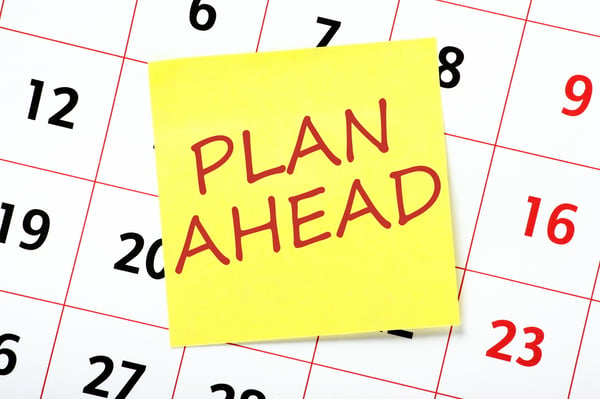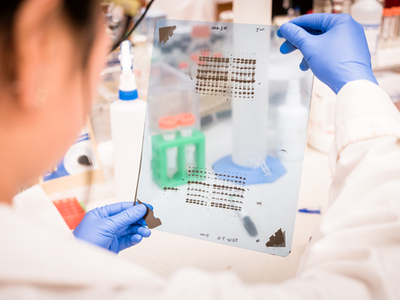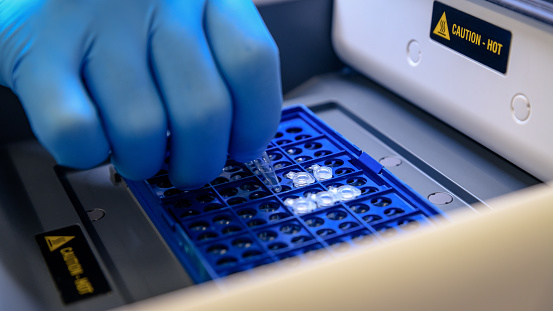With labs across the country in various stages of reopening, it can be tough to transition right back into the physical office after months of working from home. Throughout your typical day in the lab, you may find that there are many instances where you've got a few odd minutes (or even hours) here and there. Oftentimes, these periods are used to scroll through your phone or catch up on social media. Here are five suggestions on how to productively fill in those gaps while you're waiting for your experiments to run.
1. Plan the rest of your day, and plan ahead

Plan ahead to stay ahead, often easier said than done.
This can take a few forms. The first of which directly supports your most important task at hand—accurately completing the experiment that you're currently running. Rather stepping out of the lab and pulling out your phone, take a few minutes to get ahead and prep the next steps of your experiment. Review your protocol and make edits as you see necessary, and be sure to share the updated protocols with your labmates to increase your lab's overall efficiency (and to be a helpful labmate!). Check over your notes from previous experiments as well, and ensure that everything is organized and accessible for future reference. You don't want to be fumbling through your lab notebook looking for a measurement you took weeks ago.
In terms of planning ahead, if you currently have either a physical or digital calendar, you can use some of your downtime to review and add more detail to them. If you don't currently use a calendar or scheduling software, take this time to try a few apps and narrow down which will maximize your levels of organization. Both Google and Apple both make easy-to-use, free calendar software that can be particularly useful if you already own one of their branded or supported devices, as they sync calendar updates and link them to an account that can be accessed on any device. It can be tough to schedule far in advance, especially if any unforeseen circumstances arise, so we like to suggest breaking down your planning into more manageable periods such as a week or two ahead. This way, you'll still have the flexibility to adjust your calendar as you see fit and as your specific situation dictates.
2. Understand how you work best, and schedule your day accordingly
Throughout your career, you've likely discovered that you do your best work and are most focused at certain times of the day. If you're an early bird and know that you're the most productive in the morning, use this downtime to try and adjust your schedule so that you can work on your more important tasks earlier in the day. Conversely, if you need a bit of time to get going in the morning, take the first hour or so to take care of your more mundane but necessary tasks (ie. responding to emails in a timely manner). This allows you to get comfortably warmed up to start the day, and also saves you from having to go back later to finish up routine housekeeping tasks.
3. Expand upon your relevant knowledge
Take initiative and increase your relevant expertise by compiling a reading list of articles pertaining to your area of research. Though you may not have the time to read each of these papers or articles in full during gaps in your experiments, you can at least sort through and ensure that you bookmark the most useful ones to read later on. In addition, if you aren't already, use your experimental downtime to catch up on relevant news for your research. Organizations such as Nature and the American Society of Microbiology have frequently updated, interesting, and easy-to-read news sections perfect for digesting during short gaps in your day.
Another helpful tool for keeping up-to-date on the most recent and relevant academic papers is Google Scholar's Alerts. Unlike your standard email list signup that blasts all sorts of information into your inbox, Google's Alert tool allows you to curate exact topics you wish to be updated on using keywords. For example, if you're interested in newly published research regarding COVID-19, you can input that as a keyword and receive notifications only when articles specifically pertaining to COVID-19 are published.
4. Get up and get moving
You might be able to relate to this experience: you've spent a good part of the day meticulously performing DNA/RNA extractions. Just now, you've finished preparing a 96-well plate for qPCR, again all while using a single-channel pipette. You have a couple of hours to kill while waiting for your qPCR to run.
Pipetting-heavy experiments can truly become a mind-numbing experience once you've prepared a few 96-well plates, so it can be profoundly beneficial to give your eyes and your hand a break. Take a quick walk around your building, preferably outdoors, and enjoy your surroundings. Be sure to frequently check on your experiment while it runs and try to stay close by. Just try to do whatever you can to avoid sitting for too long.
5. Focus on your well-being
This one differs a bit from the previous tips listed above. When you're busy preparing for and working on particular experiments in the lab, you may not always be in the most comfortable or "happy" state of mind. This is beneficial in one sense, as stress is natural and some pressure is necessary to complete your work on time and to the best of your ability. However, as is human nature, you can end up internalizing this stress, only causing it to build over time. Gaps in your experiments can provide a great opportunity to practice mindful meditation, for which there are many apps that allow you to do so anywhere, even at the bench. Another helpful tip to improve your mental well-being in the lab is soundtracking your workday with an interesting podcast. This tip can be applied even while you're actively preparing and setting up your experiment, so long as you're able to keep in a headphone while you work. For a list of excellent and engaging science podcasts to round out your workday playlist, check out our previous blog post here.


.jpg)
